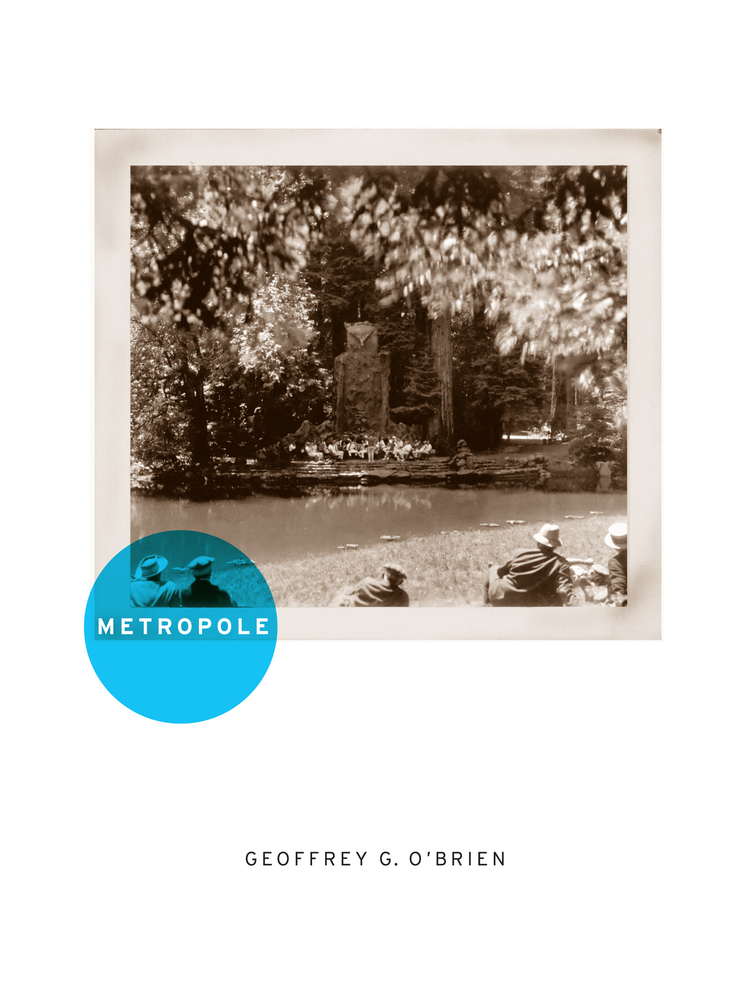Geoffrey G. O’Brien: Metropole
Despite the way the title of Geoffrey G. O’Brien’s third collection gestures towards a circumscribed center out of which some definable civic identity radiates, a cursory glance at the book’s table of contents reveals an aggressive lack of definition. Ambivalent titles like “Vague Cadence,” “Failed Catalogue,” “Ecstatic Norm,” and “To Be Read in Either Direction” resist a topography that privileges the center as its highest point. The conscience, the consciousness, at the heart of O’Brien’s collection does not draw its power from rising into relief and seeing, from its vantage, the peripheral lands below, nor is the “heart” a location in which O’Brien seems particularly interested, in the central sense; rather, O’Brien’s collection is a conscience that circulates, navigates, pulses through a sentence-level network of failures to stay still, as in blood or traffic, where a stillness indicates blockage, death.
Which is not at all to say this book’s without a heart, in the pumping sense. Metropole expands and contracts in even iambs, “in which the mouth divides and blows a bit, saying nearly what it does” (“Old War Injury”). Setting irregularities of language and syntax against a backdrop of mostly regular meter, even the eponymous 40-page prose poem that makes up the book’s second half relies on English poetry’s most easy-to-recognize respiration. The result is a book whose syntactic impulses toward the irresolvable, the slippery, are perhaps more grounded than the work of other, earlier poets—L=A=N=G=U=A=G=E poets, primarily—whose political stance towards language and its divestiture from narrative’s corrupt political uses is echoed clearly here. In these poems, “uncertainty moves like a clock” (“Three Years”). The simultaneity of uncertainty and the certitude with which we may expect it is the subject we can count on never being sure of.
This the way I get tossed, so deserted by myself
by everything endurable, that today always
seems to be moving day.
These poems are not chaotic, and they are not anarchic, despite being built out of phrase after incomplete phrase, each one tumbling into a future where the next thought, like a domino, waits to alter it. This is not a book without topography. Rather, it charts the topography of a world that it has become impossible not to define first and foremost by its barely graspable vastness, a world whose particulars are so numerous so as to have become fuzzy.
Nowhere is this numerousness clearer than in the book’s title poem, “Metropole.” Broken up into triptychs of seven-line, mostly iambic prose blocks that end abruptly mid-sentence, the poem begins, “Inaudibly, technologies lament their falling into parts have scattered anywhere a world extends.” And the poem is a world extending, gesturing outward towards its scattered parts so rapidly it can’t be contained within the limiting properties of a sentence any more than it can be confined within the structure of a stanza, a traditional paragraph, or even a book. As the poem goes on, filling with sentences that, themselves, don’t end, it approaches a kind of critical mass that challenges the notion that the units of poetry as we know them—the line, the sentence, the stanza, the book—can ever be conclusive. What it offers, instead, is the experience of moving through. It offers itself up as proof that this movement towards—even when one knows one isn’t headed for a resolution—is productive and muscular and alive, not because moving for moving’s sake is what’s at stake here, but because to claim that language, that our minds, are ever doing any other, more conclusive activity, is false.
It is difficult, when reading a book that challenges our understandings of determined topographies, of beginnings and ends, to define a single passage as representative of the whole. Rather, Metropole’s gift to the reviewer is that each passage is, itself, an embodiment of the process out of which it was built. Take the following section from the title poem:
Imagining the depths across the way men smile a definition of these dual processes. Out then back, the difference in one’s heading marked by shopping bags beneath the arm. The struggle’s right, the method obsolete. I want to call them seasons mean the orange poppies on a median. Replacement marks a tragedy can be exchanged for frames in which one sees the colored lines unfurled avoid the center of the canvas. Though on screen it looks continuous the current pulses, flowing through the grid they make …
“Though on screen it looks continuous,” indeed. In between this sentence and the last, I checked my bank balance, wrote two brief emails, and read a recap of a TV show I like. I cannot help but think that O’Brien is acutely aware of this, of the kind of mind the reader has become. These increasingly disjunctive kinds of behavior coexist alongside an equally resonant narrative of continuity—time; sense; the body, breathing—as O’Brien’s “definition of these dual processes” incorporates both the organic rhythm of the iamb and the disruptive nature of a syntax that cannot be contained.
We consume the world as we encounter it: out of order. We have, in our thinking, come a long way from the center of the city. Still, Metropole is not a book about how technology has disrupted our thinking any more than it is about how new technologies and old thinking must find a way to coexist; rather, Metropole offers us a technology of thought, one that breathes and moves like a human and still showcases the flexible capabilities of the mind at its most powerful, the sheer size of what it’s capable of, as do our best and most innovative technologies. Like every good innovation, O’Brien’s poetry is both rooted in something inarguably and elementally human, and headed towards the future by providing us with a way to process this moment, now.
 Geoffrey G. O’Brien
Geoffrey G. O’Brien